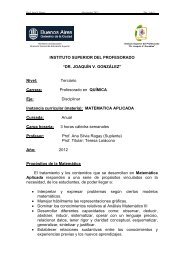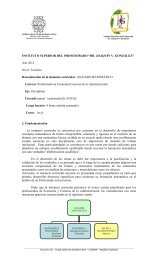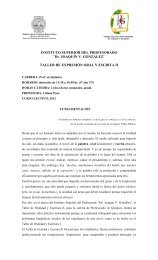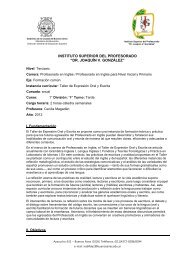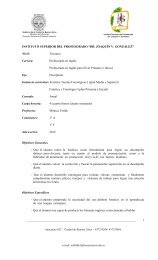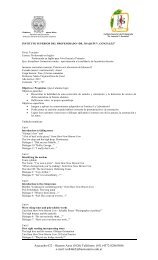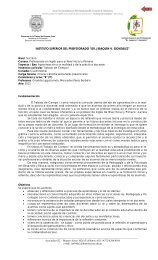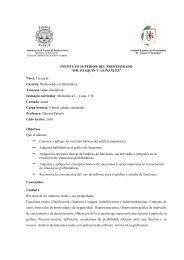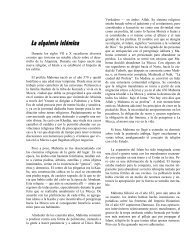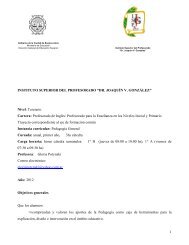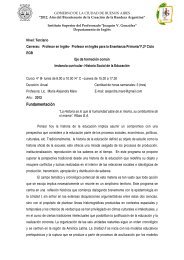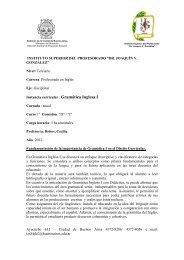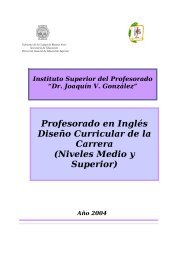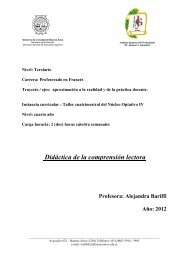Sesiones parale<strong>la</strong>s / Parall<strong>el</strong> sessionsMETTAUER, Philipp“Nosotros y los arg<strong>en</strong>tinos”. Jewish-Austrian Immigrantsin Arg<strong>en</strong>tina.”STRUTZ, AndreaHesitant Admittance: Divers Immigration Experi<strong>en</strong>cesof Austrian Jewish Refugees in Canada (Workingpaper)DEMARTINI, Zei<strong>la</strong> <strong>de</strong> Brito FabriInmigrants Betwe<strong>en</strong> Conflicts and Prejudices: VoicesWho QuestionIn this paper, we try to focus on some issues involving groups which have movedamong various contin<strong>en</strong>ts, but with the Brazilian context as main refer<strong>en</strong>ce,from which we have based our research with Portuguese, Luso-African,African, Japanese and German immigrants. We consi<strong>de</strong>r, however, the shiftsma<strong>de</strong> earlier by such groups, especially in African territories. By reflecting onhow the immigrants repres<strong>en</strong>t their experi<strong>en</strong>ces of disp<strong>la</strong>cem<strong>en</strong>t, and howthey are viewed insi<strong>de</strong> societies in which they are inserted, we b<strong>el</strong>ieve that itallows us to think about the complex re<strong>la</strong>tions established among them. At thesame time, it implies acceptance and simultaneously rejection, conflict anddiscrimination. The immigration processes put in re<strong>la</strong>tion individuals/groupswho consi<strong>de</strong>r each other as differ<strong>en</strong>t: the shape in which exchanges and disputesoccur betwe<strong>en</strong> them, in various fi<strong>el</strong>ds, can allow the <strong>de</strong>construction ofprejudices or stereotypes, its reinforcem<strong>en</strong>t or ev<strong>en</strong> the building of new ones.——————————————————————————————————————————————C<strong>en</strong>tro <strong>de</strong> Estudios y Formación Marxista——————————————————————————————————————————————Subtema / Subteme 10Memoria y trauma / Memory and traumaMesa / Session 42Coordinan / Chair: M<strong>el</strong>isa S<strong>la</strong>tman- Flor<strong>en</strong>cia Rodriguez——————————————————————————————————————————————KELHAM, MeggCreating & Confronting Community: Suici<strong>de</strong> Storiesfrom the C<strong>en</strong>tre of AustraliaSuici<strong>de</strong> is surroun<strong>de</strong>d by stigma and sil<strong>en</strong>ce leaving individuals and communitiesin a waste<strong>la</strong>nd of ignorance about how to prev<strong>en</strong>t it or how to properlysupport the bereaved. I know. As one of the bereft, I’ve experi<strong>en</strong>ced the <strong>de</strong>structionsil<strong>en</strong>ce, inappropriate questions and headline grabbing journalismcan reap. I’ve also witnessed the healing that breaking the sil<strong>en</strong>ce can bring.So wh<strong>en</strong> the M<strong>en</strong>tal Health Association of C<strong>en</strong>tral Australia asked me to recordthe stories of those bereaved by suici<strong>de</strong> as the first stage in chall<strong>en</strong>ging communitystigma and creating an audio based community of support for otherssimi<strong>la</strong>rly bereft I leapt at the chance, ev<strong>en</strong> as my mother worried. But does myown experi<strong>en</strong>ce h<strong>el</strong>p or hin<strong>de</strong>r the interview process? Do I disclose, and if so,what and wh<strong>en</strong>? And how does my cultural background affect the participationand the interviews conducted with those indig<strong>en</strong>ous C<strong>en</strong>tralians living inthe midst of what is perceived to be an epi<strong>de</strong>mic of loss and for whom speechabout <strong>de</strong>ath is discouraged? Are there questions one mustn’t ask? And howdo I honour the power of those who pour thousands of words down the t<strong>el</strong>ephonebut who refuse to be recor<strong>de</strong>d for fear of the very stigma this project is<strong>de</strong>signed to chall<strong>en</strong>ge? Are all suici<strong>de</strong>s really the same? Is breaking the sil<strong>en</strong>ceeveryone’s cure? Is there a community to create after all? And what has beingon both si<strong>de</strong>s of the interview divi<strong>de</strong> taught me about my “mainstream” <strong>oral</strong>history practice, the wisdom of “ordinary” people and the power of speech toheal? These questions will be explored using extracts from interviews alreadyconducted.El suicidio está ro<strong>de</strong>ado <strong>de</strong> “<strong>el</strong> estigma” y <strong>el</strong> sil<strong>en</strong>cio, <strong>de</strong>jando a individuos ycomunida<strong>de</strong>s <strong>en</strong> un yermo <strong>de</strong> ignorancia sobre cómo prev<strong>en</strong>irlo o cómo apoyar<strong>de</strong>bidam<strong>en</strong>te a los familiares <strong>de</strong> una persona difunta. Yo sé, como una <strong>de</strong>los afligidos, porque he vivido <strong>la</strong> <strong>de</strong>strucción, <strong>el</strong> sil<strong>en</strong>cio, <strong>la</strong>s preguntas pocoapropiadas, y he visto los titu<strong>la</strong>res s<strong>en</strong>sacionales sembrados por <strong>el</strong> periodismo.También, sin embargo, he testimoniado <strong>la</strong> curación que resulta cuandose rompe ese sil<strong>en</strong>cio. Así que cuando <strong>la</strong> Asociación <strong>de</strong> Salud M<strong>en</strong>tal <strong>de</strong> C<strong>en</strong>troAustralia me pidió que grabara <strong>la</strong>s <strong>historia</strong>s <strong>de</strong> personas afligidas por <strong>el</strong> suicidiocomo una primera etapa <strong>en</strong> <strong>de</strong>safiar <strong>el</strong> estigma y crear una comunidad <strong>de</strong>apoyo basada <strong>en</strong> audio-grabaciones para otras personas igualm<strong>en</strong>te afligidas,no <strong>de</strong>jé pasar <strong>la</strong> oportunidad, aunque mi madre estuviera preocupada. ¿Perome pregunto si mi propia experi<strong>en</strong>cia facilitaría o inhibiría <strong>el</strong> proceso <strong>de</strong> <strong>la</strong>s<strong>en</strong>trevistas? Debo reve<strong>la</strong>r o no, y si rev<strong>el</strong>o, qué cosas rev<strong>el</strong>o y cuándo? ¿Y cómoafecta mi propia formación cultural <strong>la</strong> participación <strong>de</strong> <strong>la</strong> g<strong>en</strong>te y <strong>la</strong>s <strong>en</strong>trevistasllevadas a cabo con aqu<strong>el</strong>los indíg<strong>en</strong>as “C<strong>en</strong>tralianos” que viv<strong>en</strong> <strong>en</strong> medio<strong>de</strong> una percibida epi<strong>de</strong>mia <strong>de</strong> pérdida y para qui<strong>en</strong>es no es costumbre aceptadahab<strong>la</strong>r <strong>de</strong> <strong>la</strong> muerte. ¿Hay preguntas que uno no <strong>de</strong>bería hacer? ¿Y cómorespeto <strong>el</strong> <strong>de</strong>recho <strong>de</strong> aqu<strong>el</strong>los que trasmit<strong>en</strong> miles <strong>de</strong> pa<strong>la</strong>bras por <strong>el</strong> t<strong>el</strong>éfonopero que rehúsan ser grabados por temer <strong>el</strong> mismo estigma que este proyectopret<strong>en</strong><strong>de</strong> <strong>de</strong>safiar? ¿Son iguales todos los suicidios? ¿Sirve <strong>de</strong> curación paratodo <strong>el</strong> mundo romper <strong>el</strong> sil<strong>en</strong>cio? ¿Falta realm<strong>en</strong>te crear una comunidad <strong>de</strong>spués<strong>de</strong> todo? ¿Y qué me ha <strong>en</strong>señado <strong>el</strong> haber estado <strong>en</strong> los dos <strong>la</strong>dos <strong>de</strong> <strong>la</strong><strong>en</strong>trevista sobre mi práctica <strong>en</strong> <strong>la</strong> <strong>historia</strong> <strong>oral</strong> “mayoritaria”, <strong>la</strong> sabiduría <strong>de</strong>g<strong>en</strong>te “ordinaria, y <strong>el</strong> po<strong>de</strong>r curativo <strong>de</strong> <strong>la</strong> pa<strong>la</strong>bra? Estas preguntas serán exploradasusando fragm<strong>en</strong>tos <strong>de</strong> <strong>en</strong>trevistas previam<strong>en</strong>te llevadas a cabo.KENNELLY, TamaraReconstructing the S<strong>el</strong>f After Trauma: The April 16,2007 Shootings at Virginia TechOn April 16, 2007, Seung-Hui Cho shot 32 people and hims<strong>el</strong>f at Virginia Tech.He woun<strong>de</strong>d many others. The shootings had a profound effect not only on theuniversity and the local community but also on the global community. A kindof collective awar<strong>en</strong>ess grew out of the shootings. People across the countryand around the world were saying or writing, “I am a Hokie” or “Today we areall Hokies.” The April 16, 2007 Virginia Tech Oral History and Memory Project iscollecting narratives of individuals from Virginia Tech and the <strong>la</strong>rger communityto learn their perspectives on this viol<strong>en</strong>t massacre. These trauma <strong>oral</strong>histories h<strong>el</strong>p make meaning of what happ<strong>en</strong>ed on that day and in the aftermath.By contributing their narratives to the collective memory, survivors becomeag<strong>en</strong>ts of history rather than victims of catastrophe. This pres<strong>en</strong>tationwill explore the traumatic effect of the shootings on stu<strong>de</strong>nt survivors and thediffer<strong>en</strong>t ways in which they worked to reconstruct the s<strong>el</strong>f after their or<strong>de</strong>als.Through their memories we get a vivid perception of the unreality of the ev<strong>en</strong>t,the shattering effects of trauma, and the chall<strong>en</strong>ges they faced afterward. Individualsspeak of positive remembrance and share their healing journeys. Byg<strong>en</strong>erously sharing their stories, they have chos<strong>en</strong> not only to explore theirown experi<strong>en</strong>ces but also to contribute to the collective memory and speakfor those who died.El 16 <strong>de</strong> abril <strong>de</strong>l 2007 Seung-Hui Cho les disparó a 32 personas y se disparó así mismo <strong>en</strong> Virginia Tech. El hirió a muchos otros también. Estos disparos hant<strong>en</strong>ido un profundo efecto, no tan solo <strong>en</strong> <strong>la</strong> universidad y <strong>la</strong> comunidad local,sino también <strong>en</strong> <strong>la</strong> comunidad global. Una forma <strong>de</strong> conci<strong>en</strong>cia colectiva seformó a partir <strong>de</strong> estos disparos. Personas <strong>de</strong> todo <strong>el</strong> país y <strong>de</strong>l mundo <strong>de</strong>cían“yo soy un Hokie” o “hoy todos somos Hokies.” El Proyecto <strong>de</strong> Historia Oral yMemoria <strong>de</strong>l 16 <strong>de</strong> Abril <strong>de</strong>l 2007, ha estado reuni<strong>en</strong>do narrativas <strong>de</strong> difer<strong>en</strong>tesindividuos <strong>de</strong> Virginia Tech y <strong>de</strong> <strong>la</strong> comunidad que los ro<strong>de</strong>a, para conocer susperspectivas sobre esta viol<strong>en</strong>ta masacre. Estas perspectivas sobre trauma<strong>de</strong> <strong>historia</strong> <strong>oral</strong> ayudan a c<strong>la</strong>rificar y hacer s<strong>en</strong>tido <strong>de</strong> lo que pasó <strong>en</strong> ese díay días <strong>de</strong>spués. <strong>Los</strong> sobrevivi<strong>en</strong>tes, al compartir sus narrativas <strong>de</strong> memoriacolectiva, se conviert<strong>en</strong> <strong>en</strong> ag<strong>en</strong>tes <strong>de</strong> <strong>la</strong> <strong>historia</strong> <strong>en</strong> vez <strong>de</strong> víctimas <strong>de</strong> una catástrofe.Esta pres<strong>en</strong>tación explorará los efectos dramáticos <strong>de</strong>l tiroteo <strong>en</strong> losestudiantes sobrevivi<strong>en</strong>tes, y <strong>la</strong>s formas difer<strong>en</strong>tes que <strong>el</strong>los utilizaron para reconstruirsu noción <strong>de</strong> ‘sí mismos’ a partir <strong>de</strong> sus sufrimi<strong>en</strong>tos. A través <strong>de</strong> susmemorias po<strong>de</strong>mos obt<strong>en</strong>er una vívida percepción <strong>de</strong> <strong>la</strong> irrealidad <strong>de</strong>l ev<strong>en</strong>to,los <strong>de</strong>strozadores efectos <strong>de</strong>l trauma, y los obstáculos <strong>en</strong>contrados posteriorm<strong>en</strong>te.Las personas hab<strong>la</strong>n <strong>de</strong> los recuerdos positivos y compart<strong>en</strong> experi<strong>en</strong>cias<strong>de</strong> sus viajes <strong>de</strong> recuperación. Al compartir g<strong>en</strong>erosam<strong>en</strong>te sus <strong>historia</strong>s,<strong>el</strong>los han s<strong>el</strong>eccionado, no so<strong>la</strong>m<strong>en</strong>te explorar sus propias experi<strong>en</strong>cias, sinotambién contribuir a <strong>la</strong> memoria colectiva <strong>de</strong> todos y hab<strong>la</strong>r por aqu<strong>el</strong>los queperdieron <strong>la</strong> vida.LEH, Almut“That was normal to us”. How German childr<strong>en</strong> experi<strong>en</strong>cedWorld War II and how this influ<strong>en</strong>ced theirfurther life2004 Sabine Bo<strong>de</strong>, a German journalist, published a book titled “The forgott<strong>en</strong>G<strong>en</strong>eration. Childr<strong>en</strong> of war break their sil<strong>en</strong>ce”. Surprisingly this book becamean extraordinary success. Surprisingly because till th<strong>en</strong> no one raised theobvious question how German childr<strong>en</strong> experi<strong>en</strong>ced the World War II and howthey managed to cope with the trauma many of them presumably suffered.Maybe just because nobody asked these questions for nearly six <strong>de</strong>ca<strong>de</strong>s thebook caused a dam burst or was at least the most visible sign indicating a remarkablechange in German remembrance culture.106
Sesiones parale<strong>la</strong>s / Parall<strong>el</strong> sessionsSince the 1970 th the historical as w<strong>el</strong>l as the social and political perspectiveon National Socialism and Word War II was dominated by the victims, first ofall victims of the Holocaust followed by other persecuted groups. Asi<strong>de</strong>, therewas <strong>de</strong>finit<strong>el</strong>y no room for the experi<strong>en</strong>ce of Germans being victims in someway or other as w<strong>el</strong>l. For those Germans, who experi<strong>en</strong>ced the war as part oftheir childhood, this dogma of remembrance seems to work twice. Not onlythat historical sci<strong>en</strong>ce and politics did not acknowledge or ev<strong>en</strong> notice theirsuffering, they thems<strong>el</strong>ves never paid att<strong>en</strong>tion to their very special childhood.“That was normal to us”, is what they said so far. In this s<strong>en</strong>se the term “forgott<strong>en</strong>g<strong>en</strong>eration” reveals a double meaning.In the meantime, the former childr<strong>en</strong> of war, born betwe<strong>en</strong> 1930 and 1945, reachedan age of 65 up to 80 years. They retired from their jobs and their childr<strong>en</strong>are adult and left home long ago. They look back and some seem to fe<strong>el</strong> thattheir childhood, dominated by the war in various ways, influ<strong>en</strong>ced their lifemuch more than they had admitted so far. As we know today by medical andpsychological studies not less members of this g<strong>en</strong>eration came down withm<strong>en</strong>tal and/or physical diseases that can be interpreted as long-term consequ<strong>en</strong>cesof their war experi<strong>en</strong>ces.The paper based on interviews with people who regar<strong>de</strong>d thems<strong>el</strong>ves as childr<strong>en</strong>of war and donate their interview to an association called “Childr<strong>en</strong> of warfor peace”. Ev<strong>en</strong> though the question remains op<strong>en</strong> either the war experi<strong>en</strong>ceconstitutes a g<strong>en</strong>eration or the experi<strong>en</strong>ces are too differ<strong>en</strong>t, the sample isobviously far from being repres<strong>en</strong>tative for this g<strong>en</strong>eration not ev<strong>en</strong> for childr<strong>en</strong>of war. Neverth<strong>el</strong>ess the sample conveys instructive thoughts that willbe argued on three lev<strong>el</strong>s: first, the lev<strong>el</strong> of remembered experi<strong>en</strong>ces whichwill be illustrated by typical examples; second, the lev<strong>el</strong> of s<strong>el</strong>f-interpretationfollowing the interviewee’s analysis of how the war experi<strong>en</strong>ce influ<strong>en</strong>ced theirlife and moreover pot<strong>en</strong>tially the life of their childr<strong>en</strong> and grandchildr<strong>en</strong>; andthird, the lev<strong>el</strong> of remembrance culture and politics asking for the influ<strong>en</strong>ceon individual memory and s<strong>el</strong>f-construction. The question behind is either thewar experi<strong>en</strong>ce can be evaluated as a g<strong>en</strong>eration experi<strong>en</strong>ce or the other wayround the vivid public discussion on childr<strong>en</strong> of war offers a category to reshapeand review individual memory.VON PLATO, Alexan<strong>de</strong>rOpposition Members betwe<strong>en</strong> Personal Experi<strong>en</strong>ceand “History-Politics“Which were the ways into opposition in the German Democratic Republic?What were the aims the members of the differ<strong>en</strong>t groups and circles did follow?Which were the main instrum<strong>en</strong>ts of the State Security Police (“Stasi”)against them? How did they resist? Which role did the “other part” of Germanyin the heads of these persons p<strong>la</strong>y? How did they live after reunification? Andare there contradictions betwe<strong>en</strong> the policy of the German governm<strong>en</strong>t, media,schoolbooks and the personal remembrance of the former <strong>en</strong>emies of theEast German system?These and others were the questions of a big international project at the Universityof Brem<strong>en</strong>, especially of the project part which <strong>de</strong>alt with biographiesand memories of opposition members in Po<strong>la</strong>nd, Czechoslovakia and Germany.In my lecture I will pres<strong>en</strong>t some of the main results of this project concerningGermany with some comparisons to Czechoslovakia and Po<strong>la</strong>nd.MICHAL, LoučThe Czechoslovak political trials in the 1950s. Thesecond g<strong>en</strong>erational trauma in the story of the politicalprisoner’s sonThis article contributes to the historiography of the socialist dictatorship inCzechoslovakia betwe<strong>en</strong> the years 1948–1989. The rebuilding of the society inthe Soviet way produced about 250.000 political prisoners. Most of them werejailed in the years 1948–1960, wh<strong>en</strong> the oppression took the highest rates. Thebiggest political trial in that time was with a female politician Mi<strong>la</strong>da Horákováand tw<strong>el</strong>ve other resistance group members followed by 627 people in thet<strong>en</strong>th of smaller local trials carried out around the country. While the main trialwas carried publicly by using all the state’s propaganda, the local trials remainalmost forgott<strong>en</strong> and out of the curr<strong>en</strong>t public interest.Antonín Městecký was a child wh<strong>en</strong> his father was imprisoned for 11 years inthe local show trial in Hra<strong>de</strong>c Králové. His imprisonm<strong>en</strong>t was his strongestchildhood experi<strong>en</strong>ce and wh<strong>en</strong> his father came back to home he met himas an adult and kept sil<strong>en</strong>t about the past. They never discussed what reallyhapp<strong>en</strong>ed in the time of his father’s imprisonm<strong>en</strong>t and that caused a severaltrauma to him. How can be remembered the turning point in someone’s life ifwe have only limited information about it?Using <strong>oral</strong> history methods, this paper explores how Mr. Městecký tries to <strong>de</strong>alwith this gap in his family’s history by broa<strong>de</strong>ning his childhood remembranceswith the information told to him by father’s resistance group members orfound in the books and archives. In the methodology I will also reflect in themethodology that ev<strong>en</strong> sharing his story with me was a part in the bridging thegap. His narrative contains rich accounts of life and survival as w<strong>el</strong>l as interestingmom<strong>en</strong>ts and sil<strong>en</strong>ces, revealing the complexities of narratives of traumaaffected the <strong>de</strong>sc<strong>en</strong>dants of the former political prisoners.BATISTA, EvaContemporary Narratives of Second World War inSlov<strong>en</strong>iaSlov<strong>en</strong>ia’s transformation from a socialist to <strong>de</strong>mocratic political or<strong>de</strong>r in 1991created the necessity for new means of articu<strong>la</strong>ting Slov<strong>en</strong>e national memoryand i<strong>de</strong>ntity. Since th<strong>en</strong>, struggles over interpretations of the ev<strong>en</strong>ts of theSecond World War on Slov<strong>en</strong>e territory have come to the fore. Demands werema<strong>de</strong> to come to terms with the war once and for all. However, they resultedin politico-i<strong>de</strong>ological struggles over s<strong>el</strong>ective constructions of the war pastas w<strong>el</strong>l as of the socialist past in g<strong>en</strong>eral. These struggles were furthermorefu<strong>el</strong>led by the actuary logic of (re)counting the numbers of war victims, by thediscoveries of mass graves of victims of the post-war killings during the 1990sand continue to evolve in the media, political and aca<strong>de</strong>mic spheres, as w<strong>el</strong><strong>la</strong>s everyday life.The focus of this paper is on personal war narratives as opposed to the Slov<strong>en</strong>ewar narrative, in or<strong>de</strong>r to portray the diversity and complexity of individual warexperi<strong>en</strong>ces and to give p<strong>la</strong>ce to individual s<strong>en</strong>sory memories and histories.The ethnography of eight narratives, which I collected during my fi<strong>el</strong>dwork inSlov<strong>en</strong>ia in 2011, is re<strong>la</strong>ted to exploring the re<strong>la</strong>tionship betwe<strong>en</strong> war viol<strong>en</strong>ce,i<strong>de</strong>ntity and narrative. The interviewed individuals are former Partisans, activistsof the resistance movem<strong>en</strong>t called the Liberation Front, or internees whowere <strong>de</strong>ported to conc<strong>en</strong>tration camps because of their role in the resistancemovem<strong>en</strong>t. Within the collected narratives, “residues of meaningful experi<strong>en</strong>ce”are located, which do not fit in the Slov<strong>en</strong>e war narrative and are, as such,especially important, because they <strong>de</strong>fy juridical, therapeutic or other formsof rationalisation. I <strong>de</strong>al with the personal war narratives as a form of “socia<strong>la</strong>rticu<strong>la</strong>tion”, which interv<strong>en</strong>e in the pres<strong>en</strong>t social context and are thus notmere repres<strong>en</strong>tations of the past. Strategies of adaptation, survivals and resistanceare located within the narratives and their role as sites of individuals’rec<strong>la</strong>iming and remaking of their s<strong>en</strong>se of p<strong>la</strong>ce and i<strong>de</strong>ntity in a war-affectedworld is explored.——————————————————————————————————————————————Espacio Virrey Liniers——————————————————————————————————————————————MESA PANEL 11Oríg<strong>en</strong>es <strong>de</strong> <strong>la</strong> <strong>de</strong>mocracia participativa <strong>en</strong>V<strong>en</strong>ezue<strong>la</strong>A cargo <strong>de</strong>: Margarita López Maya——————————————————————————————————————————————13.15 a 14.45 - Almuerzo——————————————————————————————————————————————14.45 a 16.45 horasC<strong>en</strong>tro Cultural G<strong>en</strong>eral San Martín——————————————————————————————————————————————Subtema / Subteme 12Migraciones, memorias <strong>de</strong>l exilio, diásporas, y <strong>la</strong>hu<strong>el</strong><strong>la</strong> <strong>de</strong> <strong>la</strong>s fronteras <strong>en</strong> <strong>la</strong> memoria / Migration,Exhile, Disaporas, and Bor<strong>de</strong>r<strong>la</strong>nds.Sa<strong>la</strong> C - Mesa / Session 52Coordinan / Chair: Mónica Gatica y Silvina J<strong>en</strong>s<strong>en</strong>——————————————————————————————————————————————DUARTE, G<strong>en</strong>i RosaMúsicos <strong>en</strong> <strong>la</strong> Triple Frontera: migraciones y <strong>de</strong>sp<strong>la</strong>zami<strong>en</strong>tosEsta comunicación se refiere a un proyecto <strong>de</strong> investigación <strong>de</strong>stinado a analizarre<strong>la</strong>tos <strong>de</strong> músicos que han trabajado o trabajan <strong>en</strong> <strong>la</strong> región <strong>de</strong>limitadapor <strong>la</strong> Triple Frontera, región fronteriza <strong>de</strong> Foz <strong>de</strong> Iguazú, <strong>en</strong>tre Brasil, Arg<strong>en</strong>tinay Paraguay. El objetivo <strong>de</strong>l proyecto es discutir <strong>la</strong>s distintas formas <strong>de</strong>107



